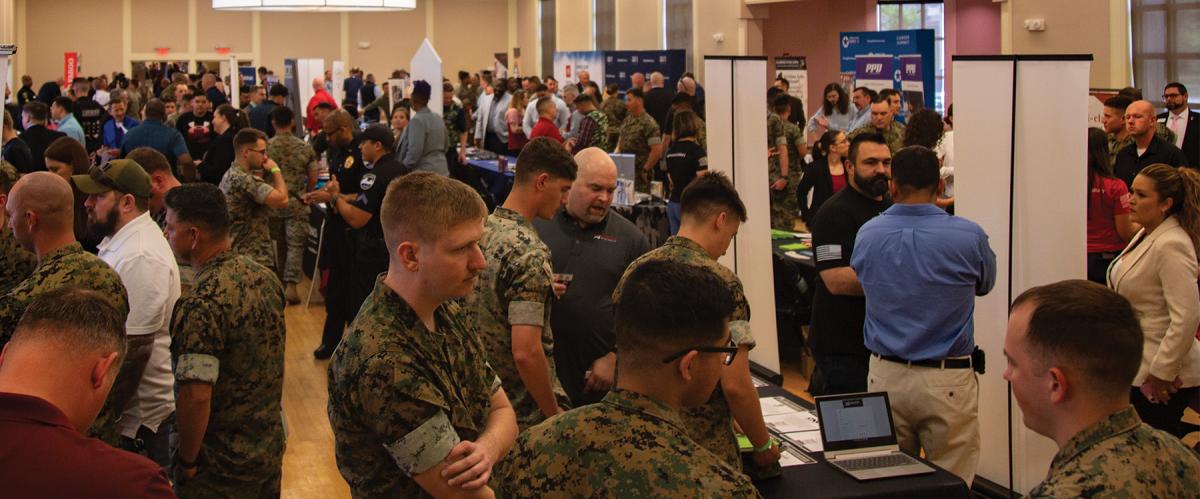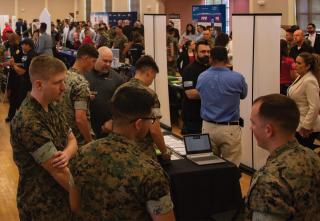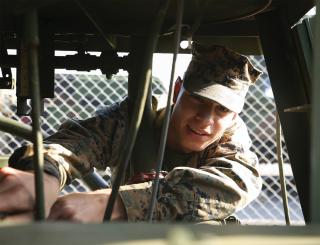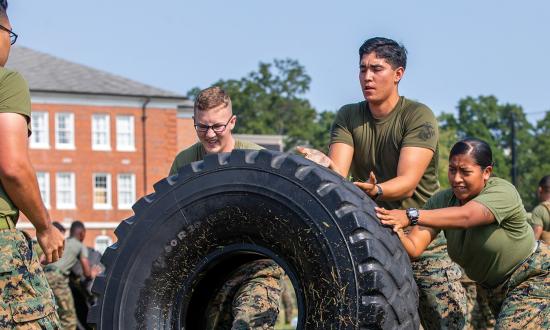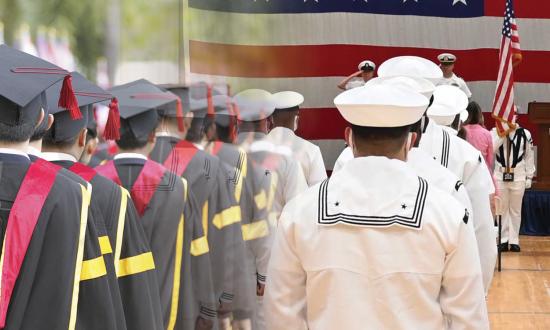We live in one of the most educated times in recorded history. In the United States, 32.9 percent of the population has a bachelor’s degree, with another 25.4 percent having completed an associate’s degree or some amount of college.1 However, only 7 percent of enlisted personnel have a bachelor’s degree.2 While this number may seem small, education is a higher priority for enlisted service members than these statistics may suggest.
Tuition Assistance
A study conducted on behalf of Army Recruiting Command in 2018 found that 32 percent of the soldiers surveyed stated they joined for the education and healthcare benefits.3 Given these findings, it is no surprise that the use of tuition assistance (TA) has been steadily increasing. The Navy saw a 30 percent increase in demand for TA in 2019, going $2 million over budget after allocating $77 million to the program.4 The Air Force saw a similar trend in 2020 when droves of junior airmen enrolled in college courses while waiting out the pandemic, leading to a funding cut from $4,500 to $3,750 per enlisted member per fiscal year because of a lack of funds. While eventually reversed, this was just one measure that limited access to TA.5 The Army also implemented similar restrictions.
In addition to going over budget, the Navy introduced time-in-service requirements that prohibit TA use before three years of active-duty service.6 The Chief of Naval Personnel at the time, Vice Admiral Robert P. Burke, even commented that junior service members were “maxing out TA use at a time in their career when they should be focusing on warfighting and warfare qualifications.”7
Enlisted service members are hungry not just for education, but also for personal and professional development. However, there are options to do so without leaving the military.
The Military Apprenticeship Program
Founded in 1976 by the Secretary of Labor and the Secretary of the Navy, the United Services Military Apprenticeship Program (USMAP) functions similarly to a civilian apprenticeship. Every program is tailored to the job in question. For example, the paralegal certification is set at 4,000 hours and requires experience in legal research, affidavits, subpoenas, and other office clerk functions. Participants who successfully complete the program receive journeyman cards and certifications from the Department of Labor.8 USMAP allows service members to become certified in the job they already know how to perform. In addition, USMAP does not detract from the mission, averting what the vice admiral feared, and presents an alternative to college for a sailor who cannot take on multiple classes. Service members can log hours easily and gain multiple certifications in one enlistment, presenting a clear opportunity for professional development.
Unfortunately, Marines and sailors have reported a lack of knowledge of both the program and its benefits. In a 2015 study, participants surveyed expressed frustration with the small number of supervisors who have any experience with the program, let alone know of its existence.9 Proposals to fix the issues with USMAP, including implementing classes on apprenticeship in schoolhouses or establishing a refresher course for supervisors, have already been raised. However, these proposals lack the resources to be effective.
Education at the Forefront
Another issue is the lack of guidelines on how to transfer credits from military education into the college track. Consider one of the few professional military education (PME) courses available to legal clerks, the Paralegal Research and Writing course. This course is taught with the same books and materials given to civilian paralegals but offers no college credits. This is caused in part by the different standards by which colleges judge military transcripts.
Each university evaluates the service member’s joint service transcript.10 This document lists the classes taken throughout a service member’s career and matches them to the applicable college credits. Schools use this form to determine the number of college transfer credits a service member can receive from his or her experience in the military, often applied to degree requirements in a major, general education, or electives. Unfortunately, this evaluation is often not proportional to the service member’s experience and schooling, counting for few, if any, credits.11 With
A Marine works on completing hours for a USMAP apprenticeship. While a useful tool for professional development both in and outside of the military, service members have reported an overall lack of knowledge about the program.
the crackdown on TA use, how can service members best transfer the classes needed for their military jobs and job qualifications into credit that will benefit them after their service? The answer lies in the individual states.
Indiana, one of 13 states in the Multi-State Collaborative on Military Credit, has passed legislation specifically for the review and transfer of military credits in the state.12 This policy requires state colleges to adopt a guideline for awarding academic credit for military experience, such as a set number of credits for the schooling received in basic training.13 These credits shorten time needed to earn a degree and can prevent service members from repeating classes they have already completed. The services also could empower local commanding officers to work with community colleges and vocational schools on the certification of military courses, fostering positive relationships with their commands and local educators at the same time.
Ensuring Success after the Military
In response to a national survey from 2015, 38 percent of active-duty and retired military personnel stated that the transition to civilian life was the most significant challenge facing veterans, with 25 percent stating that finding civilian employment was the greatest challenge.14 Currently, the services have few resources specifically for transitioning out of the military, relying on weeklong seminars focusing on resume building, networking, and education on how to find a job or get accepted into college once separated. While these seminars can be helpful, more needs to be done.
A possible solution would be developing separation roadmaps for each military occupational specialty (MOS), not dissimilar to the current retention roadmaps. The roadmap would list the potential jobs available after the military and how veterans can set themselves up for these positions well ahead of their separation. These guides would be most applicable during the first and second tours, developing enlisted in their MOS continually through the ranks. Not only would this enable the services to better equip veterans entering the civilian sector, it also would instill confidence in those who choose to reenlist, knowing they have developed their career to a point of mastery.
Looking Forward
It is imperative to focus on programs that do not interfere with warfighting and unit readiness. Background certifications such as USMAP or military education course credits will allow enlisted service members to further their careers outside of college, using resources already provided by the military. Developing separation roadmaps also will better prepare service members for jobs in the civilian sector, and the continued development and advertisement of existing but underused programs is integral to fully developing all service members.
1. U.S. Census Bureau, “Census Bureau Releases New Educational Attainment Data,” Census.gov, 24 February 2022.
2. Kim Parker, Anthony Cilluffo, and Renee Stepler, “6 Facts about the U.S. Military and Its Changing Demographics,” Pew Research Center, 13 April 2017.
3. Todd C. Helmus et al., Life as a Private: A Study of the Motivations and Experiences of Junior Enlisted Personnel in the U.S. Army, RAND Corporation, 14 May 2018.
4. Chief of Naval Personnel, “Tuition Assistance and Navy College Program Policy Updates Announced,” U.S. Navy Office of Information, 21 May 2019.
5. Secretary of the Air Force, “Department of the Air Force Restores Previous Military Tuition Assistance Cap and AF COOL Funding,” U.S. Air Force, 19 November 2020.
6. Jim Absher, “Navy Cracking Down on Tuition Assistance Eligibility,” Military.com, 21 May 2019.
7. Absher, “Navy Cracking down on Tuition Assistance Eligibility.”
8. ApprenticeshipUSA, “Case Studies: United Services Military Apprenticeship Program,” Apprenticeship.gov.
9. Robert Lerman et al., The United Services Military Apprenticeship Program, Urban Institute, November 2015.
10. “College Credit for Military Experiences: Joint Services Transcript (JST),” DANTES.
11. Jon Marcus, “Veterans Continue to Battle for Their Military Training to Count as College Credit,” The Hechinger Report, 22 December 2016.
12. Indiana Code Title 21, Higher Education §21-42-7-1 (West) et. Seq, last updated 8 June 2021.
13. Gina Johnson and Sara Appel, “Military Transcript and Experience Review: A 13-State Scan of Policies,” Midwestern Higher Education Compact, December 2020.
14. Nancy Berglass and Margaret C. Harrell, “Well After Service: Veteran Reintegration and American Communities,” Center for a New American Security, 11 April 2012.



